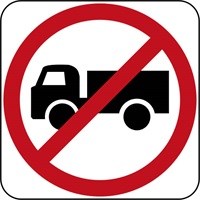The proposal from The Department of Transport to ban trucks exceeding nine tonnes from public roads during peak hours, has elicited a strong reaction from businesses. According to the Johannesburg Chamber of Commerce and Industry (JCCI), such a change will also incur costs for the consumers if implemented, as operators will be forced to put more vehicles on the road.
The new regulations state that goods vehicles exceeding 9,000kg cannot use public roads from between 06:00 - 09:00 and 17:00 to 20:00 Mondays to Fridays. "It is clear that, at the time of the announcement, no meaningful, if any, consultation had taken place with neither the private sector nor other affected government departments," said Joan Warburton-McBride, CEO of the JCCI; "As is so often the case, the far-ranging consequences, including the cost implications of this proposed policy implementation have not been considered."
Road safety the main concern
The Transport Department cited road safety as a concern and, in an attempt to curb road death tolls, this is one of their reasons for wanting to restrict goods vehicles on public roads during peak hours. "However, this ban would most likely result in more trucks being on the road at night which will have further implications for road safety as most accidents occur between 22:00 - 06:00," says Warburton-McBride; "To ensure drivers and trucks are off the roads, investment will need to be made in additional off road holding facilities - impacting on security of drivers, vehicles and goods."
The economic losses would be substantial. In addition to the level of productivity per truck being severely affected, the timely delivery of raw materials and consumer goods would be affected. "Freight carriers will need to resort to buying additional smaller trucks, thus increasing the number of trucks on the road and these additional costs will more than likely be handed over to consumers, who are already under immense financial pressures given current economic strains," adds Warburton-McBride.
A considerable cost to the national economy
The different elements of the transport system are interconnected and interdependent - measures that affect the efficiency of one mode will affect the whole system. "The South African ports, which are already congested, would become gridlocked at a considerable cost to the national economy. In addition this will further reduce South Africa's status as the preferred logistical gateway to the SADC region," adds Warburton-McBride.
At a meeting of concerned parties, and the Department of Transport, held at the Chamber, the view was expressed that the issue that needs to be tackled stems from a lack of law enforcement.
"The Chamber has also raised its concerns with the City Council and the Province and will continue to vigorously oppose any regulations that further hamper business operations," concludes Warburton-McBride.


































